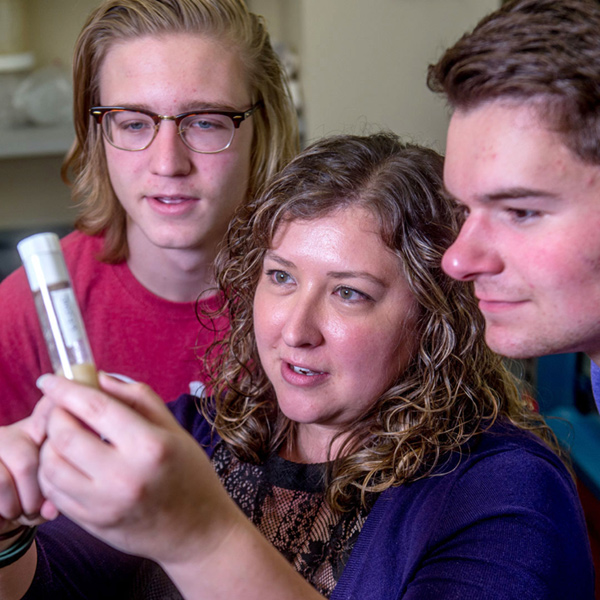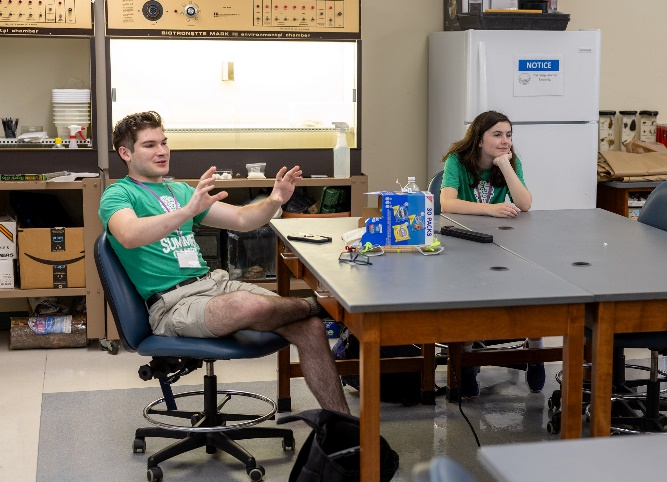STEM Camp 2026
 The University of Evansville Biology, Chemistry, Mathematics, Computer Science, and Civil Engineering departments will jointly host a middle school STEM camp in 2026. Rising 5th to 8th grade students who are interested in hands-on exploration of STEM concepts and applications are encouraged to attend.
The University of Evansville Biology, Chemistry, Mathematics, Computer Science, and Civil Engineering departments will jointly host a middle school STEM camp in 2026. Rising 5th to 8th grade students who are interested in hands-on exploration of STEM concepts and applications are encouraged to attend.
STEM Topics
The following are examples of hands-on applications that may be included in 2026.
Using Data Science to make sense of the world
It seems like everything we do is collected and stored as data. From streaming shows to shopping to healthcare to the use of our devices. But for what purpose? Companies, organizations, the government, and any other entity that uses data are trying to extract value and meaning from that data. They use sophisticated techniques to be able to learn more about you and your habits. In this session, students will begin to see the power of statistics and data science and how they can use it to benefit their own lives.
Testing for antibiotic-resistant bacteria
You will contribute to a nationwide program by testing for antibiotic resistance genes in environmental soil samples isolated in the Evansville area. You will learn how antibiotic resistant infections affect humans and may be linked to antibiotic use on farms. Then, you will test soil samples using molecular techniques to detect the presence of bacteria in our community. You will get hands-on experience extracting DNA from soil, amplifying DNA from your samples, and then analyzing the DNA to determine if antibiotic-resistant genes are present. You will also use bioinformatics tools to compare antibiotic resistant genes in bacteria. Finally, you will contribute your data to a national database of antibiotic resistance surveillance.
Engineering Materials with Chemistry
The materials used for engineering and construction can be engineered to have the properties needed for their application. Engineers can use chemistry to adjust a concrete mixture or design a metal alloy. Students will learn about how chemistry affects key engineering materials and gain hands-on experience using a chemical reaction to produce concrete.
Bridge Design and Construction
How can bridges support thousands of pounds above a river with hardly any support below? Engineers use math and physics to design bridges that are not only strong, but also as lightweight and inexpensive as possible. Students will learn about important concepts in structural design and use a simulator to design their own bridge for both strength and cost considerations.
Natural Language Processing in Machine Learning
Natural Language Processing (NLP) is a branch of artificial intelligence focused on enabling computers to understand, interpret, and generate human language. Its applications are diverse, including the creation of chatbots and virtual assistants for natural language interaction, sentiment analysis for gauging opinions in text data, speech recognition for voice-controlled systems, and machine translation for converting text between languages. NLP is also crucial in tasks such as text summarization, information extraction, named entity recognition, question answering systems, text classification, language generation, and has wide-ranging applications in fields like healthcare, finance, and more, showcasing its versatility in enhancing human-computer interaction and information processing. Students will process language data to train, test, and optimize NLP.
Career Discovery and College Prep
- Learn about the career paths available to STEM majors
- Meet with current UE students to learn what research they’re doing this summer, and what they plan to do after college
More
Camp fees include a camp T-shirt, opportunities to check out what’s happening in the other camps on campus, and more!
New for Summer 2026! We no longer provide lunch for full-day camps. Youth registrants will need to bring their lunch daily if they are attending full day camps. We will continue to provide snacks to full-day and half-day camps. If someone forgets their lunch, we will provide them with a boxed lunch from our food provider for an additional fee.

Dr. Julie Merkle
(she/her/hers)
Associate Professor/Biology
Co-Director of the Eykamp Center for Teaching Excellence
Room 219, Koch Center for Engineering and Science
812-488-5026
jm757@evansville.edu
Please read the Youth Programs, Camps, & Conferences Handbook and Child Protection Policy PRIOR to registering for programs, camps, and conferences. Be advised there is a non-refundable $40 registration fee included in the price of each camp.
Our goal is to make our youth programs, camps, and conferences accessible to students regardless of their ability to pay. Thanks to generous funding from Lilly Endowment Inc., we can offer financial assistance to students who demonstrate need. If you are interested in receiving Financial Assistance, please complete the Financial Assistance Request Form BEFORE registering. Please allow up to two business days for your request to be processed. Because demand for assistance is great and funds are limited, we encourage parents/guardians to apply early.

